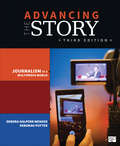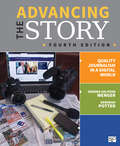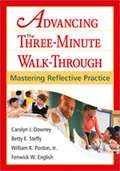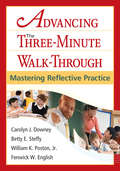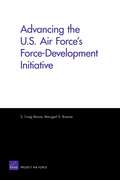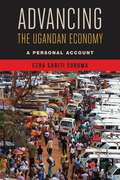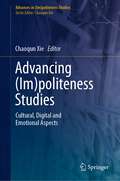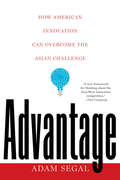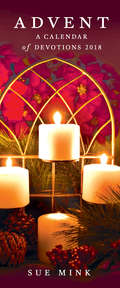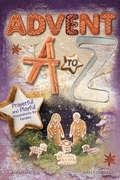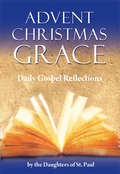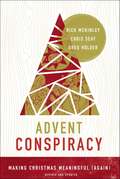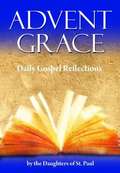- Table View
- List View
Advancing the Science of Climate Change
by National Research Council of the National AcademiesClimate change is occurring, is caused largely by human activities, and poses significant risks for-and in many cases is already affecting-a broad range of human and natural systems. The compelling case for these conclusions is provided in Advancing the Science of Climate Change , part of a congressionally requested suite of studies known as America's Climate Choices. While noting that there is always more to learn and that the scientific process is never closed, the book shows that hypotheses about climate change are supported by multiple lines of evidence and have stood firm in the face of serious debate and careful evaluation of alternative explanations. As decision makers respond to these risks, the nation's scientific enterprise can contribute through research that improves understanding of the causes and consequences of climate change and also is useful to decision makers at the local, regional, national, and international levels. The book identifies decisions being made in 12 sectors, ranging from agriculture to transportation, to identify decisions being made in response to climate change. Advancing the Science of Climate Change calls for a single federal entity or program to coordinate a national, multidisciplinary research effort aimed at improving both understanding and responses to climate change. Seven cross-cutting research themes are identified to support this scientific enterprise. In addition, leaders of federal climate research should redouble efforts to deploy a comprehensive climate observing system, improve climate models and other analytical tools, invest in human capital, and improve linkages between research and decisions by forming partnerships with action-oriented programs.
Advancing the Science to Improve Population Health: Proceedings of a Workshop
by Engineering Medicine Health Theresa Wizemann Roundtable on Population Health Improvement National Academies of Sciences Medicine Division Board on Population Health Public Health PracticeIn September 2015, the National Academies of Sciences, Engineering, and Medicine hosted a workshop to explore the basic and translational research needs for population health science, and to discuss specific research priorities and actions to foster population health improvement. The workshop was designed to provide frameworks for understanding population health research and its role in shaping and having an effect on population health, identify individual and institutional facilitators and challenges regarding the production, communication, and use of research for population health improvement, and identify key areas for future research critical to the advancement of population health improvement. This publication summarizes the presentations and discussions from the workshop.
Advancing the Story: Journalism in a Multimedia World
by Debora R. Wenger Deborah PotterThis fully updated Third Edition of Advancing the Story, by Debora Halpern Wenger and Deborah Potter, builds on the essential strengths of the original text by providing clear instruction on reporting and producing for multiple platforms, real-world examples, advice from professional journalists and exercises to stimulate additional conversations. By focusing on the skills journalists need to leverage social media and capitalize on the use of mobile devices, the authors explore the role data-driven journalism is playing in the profession. Throughout the book, new screen shots, images, research and examples of broadcast and multimedia reporting bring concepts to life. Additionally, a greater emphasis on journalism ethics permeates the book, with each chapter now including a series of discussion starters to ensure that students consider the ethical implications of their journalistic decisions.
Advancing the Story: Journalism in a Multimedia World (Third Edition)
by Debora R. Wenger Deborah PotterThis fully updated Third Edition of Advancing the Story, by Debora Halpern Wenger and Deborah Potter, builds on the essential strengths of the original text by providing clear instruction on reporting and producing for multiple platforms, real-world examples, advice from professional journalists and exercises to stimulate additional conversations. By focusing on the skills journalists need to leverage social media and capitalize on the use of mobile devices, the authors explore the role data-driven journalism is playing in the profession. Throughout the book, new screen shots, images, research and examples of broadcast and multimedia reporting bring concepts to life. Additionally, a greater emphasis on journalism ethics permeates the book, with each chapter now including a series of discussion starters to ensure that students consider the ethical implications of their journalistic decisions.
Advancing the Story: Quality Journalism in a Digital World
by Debora R. Wenger Deborah PotterUpdated Edition of Bestseller! It’s a multimedia world, and today’s journalists must develop a multimedia mindset. How does this way of thinking change the newsgathering and news production processes? Having conceived of and written their book in this changed media landscape, broadcast veterans Debora Halpern Wenger and Deborah Potter seamlessly build on the fundamentals of good news reporting while teaching students to use depth, interactivity and immediacy as they maximize the advantages of each platform. While retaining the book’s clear instruction and advice from those in the trenches, Advancing the Story, Fourth Edition has been updated to reflect the latest issues and trends with: greater emphasis on social media and mobile media to gather, promote and disseminate news content; expanded coverage of media ethics and media law; extended examples of effective reporting across multiple platforms; updated writing exercises and new resources for reviewing AP style; and additional interviews with journalists at the forefront of industry changes.
Advancing the Story: Quality Journalism in a Digital World
by Debora R. Wenger Deborah PotterUpdated Edition of Bestseller! It’s a multimedia world, and today’s journalists must develop a multimedia mindset. How does this way of thinking change the newsgathering and news production processes? Having conceived of and written their book in this changed media landscape, broadcast veterans Debora Halpern Wenger and Deborah Potter seamlessly build on the fundamentals of good news reporting while teaching students to use depth, interactivity and immediacy as they maximize the advantages of each platform. While retaining the book’s clear instruction and advice from those in the trenches, Advancing the Story, Fourth Edition has been updated to reflect the latest issues and trends with: greater emphasis on social media and mobile media to gather, promote and disseminate news content; expanded coverage of media ethics and media law; extended examples of effective reporting across multiple platforms; updated writing exercises and new resources for reviewing AP style; and additional interviews with journalists at the forefront of industry changes.
Advancing the Three-Minute Walk-Through: Mastering Reflective Practice
by Carolyn J. Downey Betty E. Steffy William K. Poston Fenwick W. EnglishHow to successfully achieve a high-performance culture for entire schools! This sequel to the bestseller, The Three-Minute Classroom Walk-Through, helps school leaders put into practice a vision for changing schools one teacher at a time. While classic supervision often consists of superior-subordinate relationships, the authors offer a practical, time-saving alternative that cultivates autonomous teachers who are continually improving their skills. This ongoing and paperless walk-through model makes it possible to: Conduct frequent, short, informal professional conversations that reinforce a reflective teaching practice; Improve and strengthen relationships between principals, teachers, students, and parents; Collaborate regularly to evaluate, redefine, and strengthen best teaching practices.
Advancing the Three-Minute Walk-Through: Mastering Reflective Practice
by Carolyn J. Downey Dr William K. Poston Dr Fenwick W. English Betty E. Steffy-EnglishMaster the Downey Walk-Through for reflective dialogue with this must-have sequel! This sequel to the best-selling The Three-Minute Classroom Walk-Through gives school leaders an expanded examination of the Downey Walk-Through model of coaching and supervision. Clarifying common misconceptions and misapplications, the authors focus on how to engage teachers in reflection and professional dialogue after the walk-through to improve their practice. The resource provides examples, activities, and guidelines for changing schools one teacher at a time, and shows leaders how to: Provide effective follow-up discourse without criticizing or demoralizing teachers Build collegial relationships with staff Help teachers see their power to become continuously improving professionals
Advancing the U.S. Air Force's Force-Development Initiative
by S. Craig Moore Marygail K. BraunerThe following steps are recommended for consistent, efficient, and effective plans and means for improving the development of U.S. Air Force officers in their career fields: (1) identify the demand for jobs in the field grades-major, lieutenant colonel, and colonel; (2) ascertain the backgrounds that officers have accumulated (assess the supply); (3) compare supply with demand (gap analysis); and (4) plan ways to close the gaps.
Advancing the Ugandan Economy
by Ezra Sabiti SurumaInternal conflicts, dictatorship, and economic disintegration characterized the first twenty-five years of Uganda's independence from British colonial rule, which culminated in the reign of Idi Amin and a violent civil war. The country has since achieved an astounding turnaround of stability and growth. Advancing the Ugandan Economy is a first-hand look at the remarkable policy changes that took place from 1986 to 2012 and their effect in contrast with the turbulent events after independence.Ezra Suruma held several key positions in the Ugandan government during the nation's transition period, including minister of finance. His insightful recounting of those times demonstrates that African countries can achieve economic stability and sustain rapid growth when they meet at least two interdependent conditions: establishing a stable and secure political framework and unleashing entrepreneurialism. Suruma also highlights the strategic areas that still require fundamental reform if Uganda is to become a modern state and shares his vision for the future of his country.Rarely in African history has so much positive political and economic transformation of a country been achieved in such a short time. Suruma's account of the commitment, determination, vision, and dexterity of the Ugandan government holds invaluable lessons in managing the still complex policy challenges facing the African continent.
Advancing the Ugandan Economy: A Personal Account
by Ezra Sabiti SurumaInternal conflicts, dictatorship, and economic disintegration characterized the firsttwenty-five years of Uganda's independence from British colonial rule, which culminatedin the reign of Idi Amin and a violent civil war. The country has since achieved anastounding turnaround of stability and growth. Advancing the Ugandan Economy isa first-hand look at the remarkable policy changes that took place from 1986 to 2012and their effect in contrast with the turbulent events after independence. Ezra Suruma held several key positions in the Ugandan government during the nation'stransition period, including minister of finance. His insightful recounting of thosetimes demonstrates that African countries can achieve economic stability and sustainrapid growth when they meet at least two interdependent conditions: establishinga stable and secure political framework and unleashing entrepreneurialism. Surumaalso highlights the strategic areas that still require fundamental reform if Uganda is tobecome a modern state and shares his vision for the future of his country. Rarely in African history has so much positive political and economic transformationof a country been achieved in such a short time. Suruma's account of the commitment,determination, vision, and dexterity of the Ugandan government holds invaluablelessons in managing the still complex policy challenges facing the African continent.
Advancing: Cultural, Digital and Emotional Aspects (Advances in (Im)politeness Studies)
by Chaoqun XieThis volume pushes forward research on (im)politeness by focusing on interpersonal interaction's cultural, digital and emotional aspects. With contributions by established and emerging scholars in the field, this collection explores and expounds, with the combination of solid theoretical foundation and up-close empirical demonstration, how (im)politeness not only gives but also gives off communicative and interpersonal meaning in diverse cultural contexts. Included are chapters on how (im)politeness contributes to the construction of social reality online and in social media and how (im)politeness prompts and is prompted by emotional sensitivities. This book is of interest and value to students and researchers in the field and those keen to know how effective human existence and essence are possible through the lens of (im)politeness.
Advantage: How American Innovation Can Overcome the Asian Challenge
by Adam Segal"Thoughtful . . . . [Segal's] striking argument is that the challengers [India and China] lack America's resilient, open and risk-taking culture." --Economist The emergence of India and China as economic powers has shifted the global landscape and called into question the ability of the United States to compete. Advantage sorts out the challenges the United States faces and focuses on what drives innovation, what constrains it, and what strengths we have to leverage. Entirely recasting the stakes of the debate, Adam Segal makes the compelling case for the crucial role of the "software" of innovation. By bolstering its politics, social relations, and institutions that move ideas from the lab to the marketplace, the United States can preserve its position as a global power. With up-to-the minute economic and political data, this is a resounding call to tie innovation to larger social goals in an age of global science and technology.
Advent A Calendar of Devotions 2018 (Pkg of #10)
by Sue MinkThe season of Advent provides an opportunity for spiritual renewal for followers of Christ. But often what happens is that we get so caught up in the hurry and rush, the hustle and bustle, the frantic pace of the season that we emerge more spiritually exhausted than refreshed and more disillusioned than inspired to face the coming of a new year. We may have tried so hard to enjoy the holiday season, to recapture a sense of wonder and mystery, only to end up asking, "Is that all there is?" The purpose of Advent A Calendar of Devotions 2018 is to help you focus on the things that truly matter during this busy season so that you can experience spiritual renewal.
Advent A Calendar of Devotions 2019 (Pkg of 10)
by Teer HardyProviding daily devotions for Christians preparing to celebrate Christ's birth, this annual favorite is a great resource for you and other members of the congregation. The seemingly simple handout is filled with opportunities for spiritual renewal, you to focus on the coming Christ at the center of both the season and in your life. Beginning on the first Sunday of Advent and ending on Christmas Day, each day's devotional includes a suggested Scripture, a short devotion, and a closing prayer.
Advent A to Z: Prayerful and Playful Preparations for Families
by John Indermark Sharon HardingScripture and tradition fill the season of Advent with an abundance of characters, themes, and symbols. Each casts a slightly different perspective on the meaning of Jesus' birth and God's promised realm, the two chief components for which this season bids our preparation. Beginning December 1 and running through December 26, each day will explore an Advent-related word that begins with a successive letter in the alphabet. This is followed by suggestions for simple, easy-to-prepare, and complete activities (discussion starters, games, crafts, meditations, journaling, outreach project, devotions). The activities are based on that day's word and are ideal for parents teaching their children about Advent.
Advent Another Look (Bible Daily Notes: Practical Application from God's Word)
by Jeff LucasChristmas is rushing toward us, and you may already be looking forward to presents, food, and time with family and friends. But for some, Christmas brings mixed emotions. Memories of happier days mean aching hearts, missing loved ones who are no longer with us. And while we&’re thrilled to celebrate the birth of our Savior, oftentimes in all the rush, festivities, and emotions, Christ is ignored or given only token recognition. In Advent: Another Look, we&’ll take a careful journey to look at the incarnation of Christ. We will see who was there, what the prophets of old had to say, and what the incarnation means. And maybe we will then be able, once again, to stand amazed at the wonder of God&’s most incredible gift of His Son, and to experience our hearts warmed afresh during this chilly season. Bible Daily notes are written by Jeff Lucas to help you apply the lessons of God&’s Word daily. Each day and with each devotion, Jeff uses his signature wit and wisdom to reveal insights and practical application you can use in your own life. Each Bible devotion takes only a few minutes to read, but the lessons learned can last a lifetime.
Advent Christmas Grace
by The Daughters of St. PaulJoin the Daughters of St. Paul as they share the fruit of their lectio divina (a prayerful reading of Sacred Scripture) in this new expanded edition of Advent Christmas Grace. This handy volume features insightful reflections on the daily Gospel readings for the Advent and Christmas seasons. Perfect for all those who value daily devotional reading, the meditations are brief and powerful. They will give enlightenment to those who are proficient in this practice and encouragement to anyone just beginning.
Advent Conspiracy: Can Christmas Still Change the World?
by Rick Mckinley Chris Seay"The story of Christ’s birth is a story of promise, hope, and a revolutionary love. So, what happened? What was once a time to celebrate the birth of a savior has somehow turned into a season of stress, traffic jams, and shopping lists. And when it’s all over, many of us are left with presents to return, looming debt that will take months to pay off, and this empty feeling of missed purpose. Is this really why we celebrate Christmas? What if Christmas became a world-changing event once again? [AC] Advent Conspiracy is an international movement restoring the scandal of Christmas by substituting compassion for consumption. For three years, Advent Conspiracy has been giving people hope that Christmas doesn’t have to be about credit cards, to-do lists and traffic jams. This four-session DVD study will introduce you to this revolution in compassion as you learn to: Worship Fully. It starts and ends with Jesus. It’s a season where love wins, peace reigns, and a king is celebrate. It’s the party of the year. Spend Less. Americans spend an average of $450 billion a year every Christmas. What if we all committed to buying just one less gift this year? Give More. God’s gift to us was a relationship built on love. Time is one of the more precious gifts we can give at Christmas, time to make love visible through relational giving. This Christmas, give presence to those you love. Love All. When Jesus loved, he loved in ways never imagined. By spending less at Christmas we have the opportunity to join him in giving resources to those who need them most. Nobody wants a Christmas worth forgetting. Welcome to the Advent Conspiracy."
Advent Conspiracy: Making Christmas Meaningful (Again)
by Chris Seay Rick McKinley Greg HolderAn updated and revised version of a book that has impacted thousands of churches: Are you tired of how consumerism has stolen the soul of Christmas? This year, take a stand! Join the groundswell of Christ-followers who are choosing to make Christmas what it should be—a joyous celebration of Jesus’ birth that enriches our hearts and the world around us, not a retail circus that depletes our pocketbooks and defeats our spirits. Advent Conspiracy shows you how to substitute consumption with compassion by practicing four simple but powerful, countercultural concepts: Worship Fully—because Christmas begins and ends with Jesus. Spend Less—and free your resources for things that truly matter. Give More—of your presence: your hands, your words, your time, your heart. Love All—the poor, the forgotten, the marginalized, and the sick in ways that make a difference. Find out how to have a Christmas worth remembering, not dreading. Christmas can still change the world when you, like Jesus, give what matters most—your presence.This updated and revised version, with some all-new content, will share stories of the impact this movement has made around the globe as well as giving individuals and churches even better, more practical help in planning the kind of Christmas that truly can change the world.New introduction, new chapter and changes throughout.
Advent Devotions & Christmas Crafts for Families: 24 Scripture Reflections & Simple Projects to Anticipate Christ's Birth
by Victoria DuerstockKeep the Focus on Jesus this Christmas with 24 Family Devotions for Advent! The flurry of shopping, gift giving, recitals, and parties adds a certain amount of tension to a season meant to be infused instead with awe and wonder. Ask most families what the focus of Christmas really is and they will readily answer that it is the birth of Christ, yet so many of us find ourselves overwhelmed with activities, travel plans, hosting, and more. Trying to prepare our hearts and our families to celebrate His birth becomes secondary while we try to survive the busyness! Victoria Duerstock wants to support families in their desire to make Christ the focus of all their celebrations this Christmas. Each day of this family devotional includes not only a Scripture and short short reflection for the twenty-four days leading up to Christmas, but also inviting full-color images and simple Christmas crafts that can be done as you focus on the rich meaning of this season. Find easy-to-follow instructions for: Stained Glass OrnamentsCinnamon Oatmeal SoapMason Jar LuminariesHomemade MarshmallowsScrap Ribbon Tree OrnamentsAnd many more! Each devotional through the four weeks of Advent is focused on the themes of Hope, Preparation, Joy, and Love and is meant to be read with the entire family, or by the older child who needs something just for them in this special season.Advent Devotions & Christmas Crafts for Families will be your new favorite holiday tradition. It makes a wonderful early Christmas gift for kids, parents, or grandparents!
Advent Grace
by Daughters of St. PaulIn this daily Advent companion, members of the Daughters of St. Paul share their reflections and lead readers in lectio divina on the Scripture readings for the season. Includes reflections for the Octave of Christmas.
Advent International and Walmart Brazil's Deal
by Victoria Ivashina Ruth Costas Pedro LevindoAdvent International, one of the world's leading private equity firms, must decide whether to acquire Walmart's subsidiary in Brazil or not. Although Walmart Brazil is losing cash at a rapid pace, Advent thinks it has a solid plan to recover the company's finances. However, there are several execution risks associated with the deal and local analysts are skeptical about the possibility of a quick turnaround.
Advent International: Kroton Investment
by Victoria Ivashina Priscilla Zogbi Ruth KostasCase - Finance


